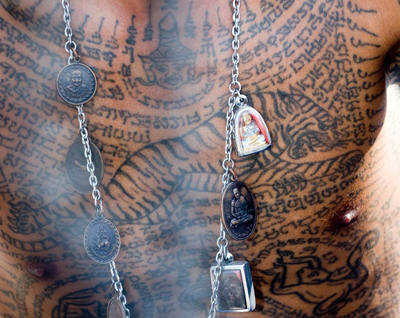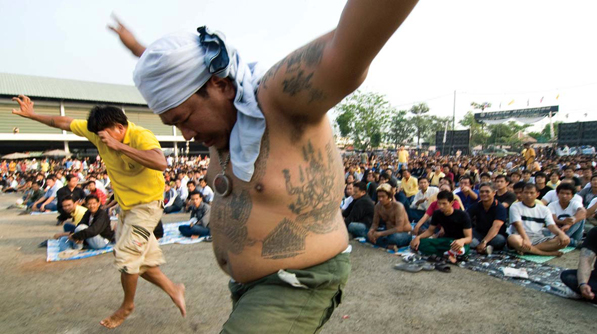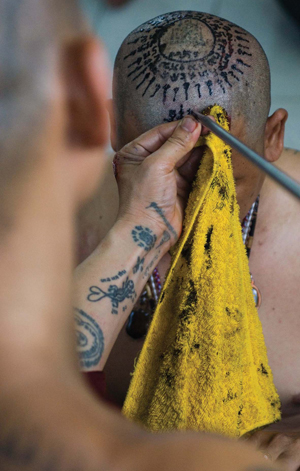Tattoo not Taboo
(Page 2 of 2)
 |
| Tattoos symbolizing protection, using a tiger image and the monkey god Hanuman of Hindu mythology (Photo: Brent T Madison) |
The most common Buddhist artwork is the sak yan, or yantra, the physical expression of a mantra. The image itself is considered sacred and may be a symbol of worship or meditation. Many images, such as the tiger and the lotus, are of Hindu origin. The script of a mantra is in ancient Pali and every line represents a point in the Buddha’s teachings.
Sak yan tattoos are religious, never decorative, and some monks apply the tattoo in invisible ink.
Tattoo Possession
Nowhere can the belief in tattoos be witnessed better than at the annual Wai Kru Festival in late March at Wat Bang Phra in Nakorn Pathom, some 30 km northwest of Bangkok.
 |
| Thai men caught up in the frenzy of the annual tattoo festival in Nakorn Pathom near Bangkok (Photo: Brent T Madison) |
The festival itself is spellbinding. Last year at dawn, some 3,000 men gathered in the dusty compound of Wat Bang Phra. Many were of dubious reputation—gangsters, drug dealers and the like—who had been injured in the past and were seeking protection from danger.
Dozens of monks sat at the front of the gathering, quietly chanting. The atmosphere was electric—at one point, the MC on the stage shouted to the crowd: “If you feel yourself going into a trance, please take off your shirt and your amulets!”
Several men had already done so. One or two started shaking uncontrollably. One enormous man with long hair and dressed only in jeans began writhing on the ground. His friends tried to hold him down, but with explosive force he jumped into the air and assumed the stance of Hanuman, one hand outstretched while he held the other above his head as if shaking an invisible tambourine.
The crowd parted to allow him through. With a terrifying shriek he leapt in the air, his eyes rolling back in his head and his body contorted with spasms. Clenching his outstretched fist like a sword, he dashed towards the stage. He careened into a wall of security men. They massaged his earlobes (which is believed to dispel the possessing spirits) and rubbed his back.
 |
| A Thai monk tattoos sacred mantras on a man’s head (Photo: Brent T Madison) |
Mass hysteria exploded a short while later. More than 30 men tattooed with images of monkeys, dragons and tigers went into a trance, screaming and writhing, then charging the stage. The security line stayed firm and held the men at bay. The group quietened down and returned to their seats.
At the end of the ceremony, the abbot sprinkled holy water on the faithful who thronged the stage. Then it was the turn of the monks to go to work. Each took his place at a small table, where queues formed to receive a mystic tattoo.
The monks chanted softly as they worked. Concentric lines of yantra were sketched into the backs and shaved skulls of the devotees all day. The men offered incense, fruit, cigarettes and small wads of cash to the monks. Then they left, no doubt feeling that little bit safer if not immortal.
« previous 1 | 2 |
